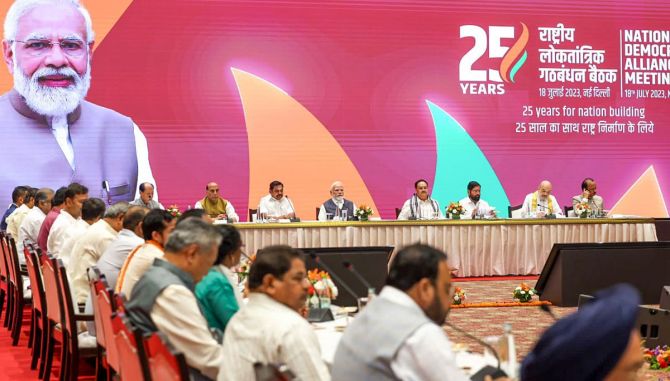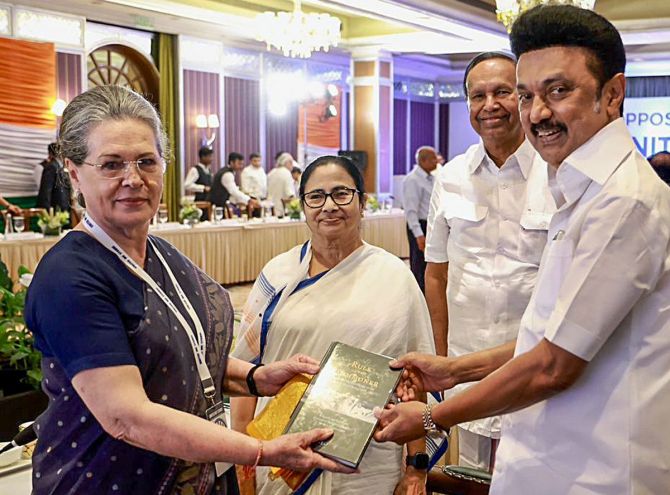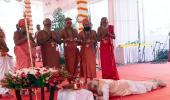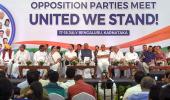AIADMK insiders see the very idea of an NDA conclave as a measure of the BJP's current electoral assessment, stemming from relative weakness in 2024 compared to 2014 and 2019.
In their reckoning, the BJP now needs allies more than the other way round, observes N Sathiya Moorthy.

On the face of it, communal events in distant Manipur should have no direct or even indirect impact on politics and elections in Tamil Nadu.
But the way the ruling Bharatiya Janata Party at the Centre and in the north eastern state have come to be portrayed for their indifference bordering on wanton collusion and more so the deafening silence of Prime Minister Narendra D Modi may have already cast their shadow and spell on the BJP-National Democratic Alliance's chances in next year's Lok Sabha polls in the southern state as possibly elsewhere too.
By the same token, the BJP's Congress rival, a partner in the ruling Dravida Munnetra Kazhagam-led alliance (call it 'I.N.D.I.A.' or whatever at the national level) may have also consolidated its position in matters seat-sharing.
The party may now want more than the nine seats allocated to it from a total of 39, of which it won eight. Barring a single seat that went to the ruling All India Anna DMK, the NDA drew a blank.
The list of losing candidates included Union minister Pon Radhakrishnan who lost in the BJP's traditional stronghold of Kanyakumari.
After losing his seat to Congress candidate H Vasanthkumar by a record 260,000 vote margin, Radhakrishnan lost the seat to the latter's son, Vijay Vasanth by 138,000 votes in the by-election caused by Vasanthkumar's death in the pandemic, still the second highest victory margin for the constituency.
On the face of it, the AIADMK should not have any problem in the NDA, especially after party boss and former chief minister Edappadi K Palaniswami was provided a place next to Modi at last week's 38-party alliance conclave.
However, AIADMK insiders see the very idea of an NDA conclave, possibly the first one after Modi became prime minister in 2019, as a measure of the BJP's current electoral assessment, stemming from relative weakness in 2024 compared to 2014 and 2019.
In their reckoning, the BJP now needs the allies more than the other way round.
Maybe, the BJP's Modi-Shah leadership might know how to turn the winds against the allies and the Opposition alike, as they had done in the past, but at least until then, especially in states like Tamil Nadu, the ruling party at the Centre may have to go slow, starting with seat-sharing talks within the local NDA.
BJP leaders at the national level notice with satisfaction how after the Delhi conclave, EPS told the apital's newsmen that Modi would return to power with 330 seats next year.
They do not want to recall how he also declared at the same news conference that the AIADMK would lead the alliance in the state and the BJP would have to take whatever seats that they offered.
Such a construct prima facie goes against the grain of what state BJP chief K Annamalai has been striving for and is talking about.
At one point not very long ago, he had declared that the BJP would lead the alliance in the state and also field 25 candidates on its own.
This implied that the AIADMK could go its own way.
Then came Union Home Minister Amit A Shah's Vellore 'clarification', if it could be called one.
He did not talk about the BJP leading an alliance but urged the Tamil voters to send at least 25 MPs to support Modi, for his installing the Sengol in a seat of honour in the new Parliament complex.
Edappadi's message should be read also in the context of Shah flagging off Annamalai's five-phase padayatra across the state in the temple island of Rameswaram on Friday, July 28.
Shah's reaction, if any, to the recent NDA developments would be keenly watched, also because of the AIADMK's other messaging after the Delhi conclave.
Both reactions from the AIADMK relates to party mouth-piece, Namadhu Amma. The daily carried just a relatively smaller picture of Modi and EPS at the Delhi conclave on page one, and relegated the news report to an equally insignificant place in an inside page.
Worse still, the report focussed almost exclusively on EPS's attacks on Chief Minister M K Stalin, to the near exclusion of the NDA conclave.

Present indications are that the BJP would want to expand its hold within the alliance by including other sure-fire candidates whom the AIADMK would co-opt if they contested under the party's 'Two Leaves' symbol.
Already, New Justice Party founder A C Shanmugam, who lost the Vellore Lok Sabha seat on an AIADMK ticket in 2019, was present at Amit Shah's Vellore rally last month.
Also present was education-entrepreneur T R Pachamuthu, better known as Paarivendhar, founder-chairman of SRM University.
Heading the Indhiya Jananayaga Katchi, he won the 2019 Lok Sabha elections from the southern Perambalur constituency on the DMK ticket.
Indications are that the BJP would want them to contest under the party's 'Lotus' symbol next year -- and include such junior allies as their wards in seat-sharing talks with the dominant DMK.
The idea would be for the BJP and allies to obtain at least 10 constituencies for candidates under the 'Lotus' symbol, in seat-sharing talks with the AIADMK.
It is also this strategy of the BJP that the AIADMK wants to puncture, possibly here and now.
By declaring that the BJP would win 330 seats under Modi, Edappadi has only acknowledged that the AIADMK would sail together, but nothing more than it.
Party insiders feel that the loss of traditional votes, including non-DMK minority votes, in such an alliance cannot be compensated by the BJP's 2-3 per cent vote-share.
According to them, even this vote share would not come to the AIADMK in constituencies where the party fielded Muslim or Christian candidates.
Ironically, in the southern region where both parties are relatively strong, the AIADMK cannot ignore Christian candidates.
In the north, where both parties are relatively weak, the AIADMK cannot overlook Muslim claimants totally.
Against this traditional background, the AIADMK especially sees further consolidation of the 15-per cent minorities votes in the state consolidating against the BJP even more after the Manipur violence.
They concede that further consolidation of the minorities' mindset would not make any change to the BJP's votes, but could add to the woes of the AIADMK ally.
The party might find even the limited minorities' votes coming its way, now going to the other side.
In select assembly segments, it could mean something, as every vote lost to the rival doubles the vote-gap between the two.
It should not surprise the BJP strategists and logistics operators if there is less enthusiasm among AIADMK candidates for election rallies addressed by Modi, Shah and other senior BJP leaders.
Worse still, AIADMK cadres feel that Modi's long silence on Manipur events in this era of social media expose and coverage across states and languages has meant something much more than losing votes.
It is about losing faith in the government and its allies, if not the system as a whole.
The nay-sayers, according to them, are not restricted to the minorities or traditional anti-BJP, anti-Hindutva voters this time.
They also come from the middle-path. Unless the BJP is able to change the narrative between now and the Lok Sabha polls, it could be problematic for the AIADMK to defend the ally, both in public rallies and at booth-levels.

Against the BJP's perceived predicament, which could include continuing inability to consolidate Hindu votes as Hindutva votes, the party's Congress rival may have scored a few points more than already.
In effect, the Congress does not have more than five per cent traditional votes.
But in the face of minority oppression, allegedly by the BJP, its vote share in the state might have nearly doubled.
Manipur has only consolidated such sentiments among minority voters in the state.
Together, the Congress and the DMK alliance stands to gain but separately, the latter would be the loser though that would not help the former win any seat, barring one or two.
It is an advantage that the DMK ally knows it cannot afford to lose.
It may also tempt state Congress leaders at least to seek more seats from the DMK.
The chances are that the DMK's Stalin may want to tie up the loose ends of seat-sharing with the Congress leadership quietly and before open discussions become necessary and possible.
Like the BJP this time in the rival alliance, the DMK might use smaller allies as a check against the Congress, making them contest under the party's 'Rising Sun' symbol.
Already, there are others like the IJP's Paarivendhar. If his informal defection has not embarrassed the DMK, it owes only to the absence of a three-line whip for party MPs to vote against the government on any particular issue or bill.
N Sathiya Moorthy, veteran journalist and author, is a Chennai-based policy analyst & political commentator.
Feature Presentation: Aslam Hunani/Rediff.com











 © 2025
© 2025